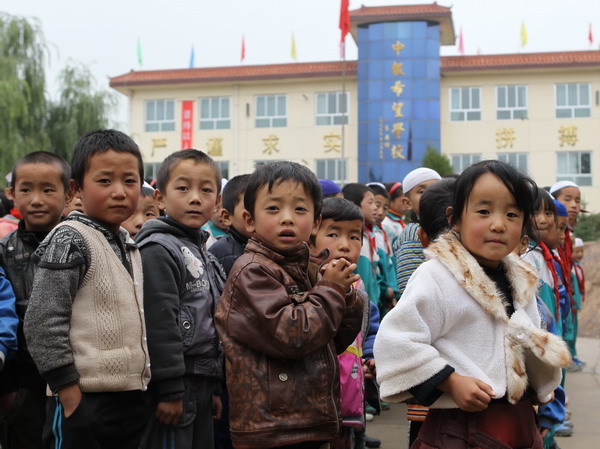Schools provide a class act for success
Updated: 2011-09-28 07:50
By Zhu Zhaoxu (China Daily)
|
|||||||||
|
 Fourth-grader Ma Lianghai (left) and third-grader Ma Linxiang are engrossed in their work during art class at Zhaojia Elementary School in Dongxiang, Gansu province, on Sept 18. [Photo by Xu Jingxing/China Daily]
|
Poverty-stricken county works to ensure every school-aged child has access to education, Zhu Zhaoxu reports from Dongxiang, Gansu.
Thirteen-year-old Ma Qidong looks smaller than his urban counterpart, but listens as attentively to the teacher as any diligent student.
The sixth-grader at the sprawling Gudu Elementary School uses a flour sack as his schoolbag to carry two dog-eared exercise books and an English textbook that has not been used since the school year started nearly a month ago.
Both Ma and the school are a snapshot of education in Dongxiang. The county, with 284,000 residents - mostly Muslims - in Gansu province, is grappling to earn a "passport to progress" by prioritizing education.
The ethnic minority autonomous county is as large as London in area, but comparisons end there - its residents mostly inhabit a bleak terrain of 1,750 ridges and 3,083 valleys, envying the prosperity lifting other parts of China.
"Dongxiang admittedly lags behind most parts of China in terms of its economy and in many other fields as well," Gao Shitai, Party secretary of Dongxiang, said. "But the most glaring disparity lies in education."
The average Dongxiang resident has only 3.7 years of education, according to Gao; the national average is 8 years.
"For this ethnic minority to survive and thrive we have to vigorously develop education. Without education there is no solid foundation," Gao said.
The Gudu school on a mountainside in Dashu, one of 24 townships in Dongxiang, is about a 40-minute drive from Suonan town, the county seat of government.
Most of the road is a rough dirt path, hewed by leveling hill slopes. On fair days, passengers are shaken and stirred; in the rains, driving is well nigh impossible.
"When the weather is fine, we have 24 students attending school, but two or three are allowed to be absent whenever it snows or rains, because it is perilous for the youngsters to trudge through ranges and ravines," said Ma Tenghui, headmaster of the Gudu school.
The campus, whose number of students has hovered around 30 since it was founded in 2001, was one of 56 basic schools Dongxiang authorities set up over the past decade to make attending schools more convenient.
Children used to walk up to 10 kilometers to reach the nearest school, and nearly 11 percent of school-agers failed to attend elementary schools 10 years ago, indicate figures from the Dongxiang Bureau of Education.
The county now has 190 elementary schools for boys and girls aged between 7 and 12, boasting a nearly 100 percent school attendance rate, according to bureau chief Zhang Xuelong.
|
 Newly-enrolled first-graders line up on the playground at China Daily-sponsored Zhongbao Hope Elementary School in Dongxiang county, Gansu province. [Photo by Xu Jingxing/China Daily]
|











